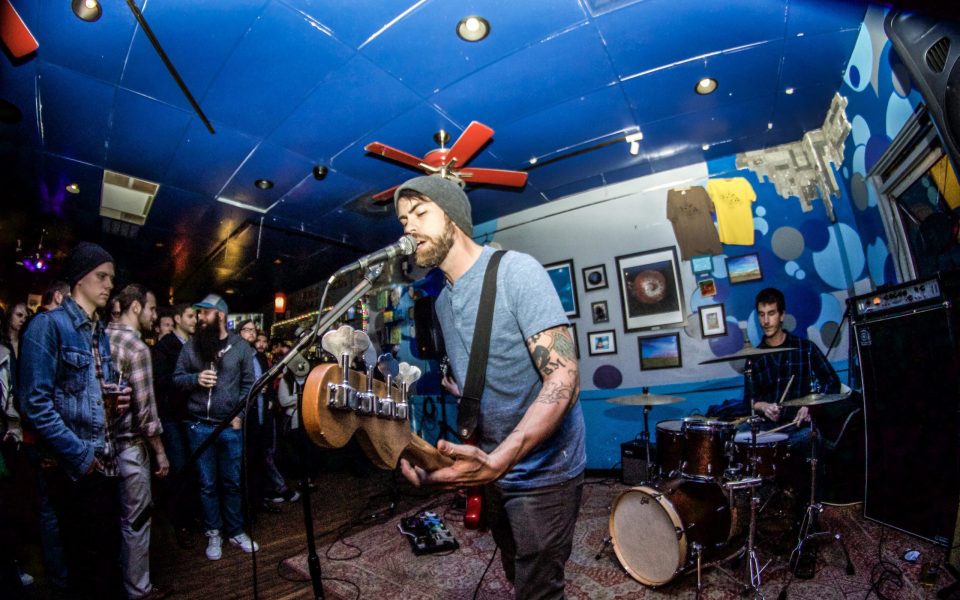Basement Life has managed to make a name for itself as a band of reclusive rockers from Greensboro by holding fast to the more punk tradition of breaking norms and doing things their own way.
Their headline set at the Dec. 16 show at the popular Tate Street venue New York Pizza was their first Triad show in almost six months. Though this sort of vanishing act might cause many bands to lose any hope of garnering a fanbase, the trio’s staggered live performances have helped them build a strong mystique, making each show a coveted gem.
Combining former members of Kudzu Wish, Social Life and Funny Like a Funeral, Basement Life are diligent purveyors of ’90s post-punk, garage-rock. The NYP bill teamed them up with Raleigh indie rockers the Old Sioux Summer and Zephyranthes for a rare night of post-punk music.
The eerie, dark melodies of Zephyranthes opened the night and hooked the crowd in a world of math rock. Self-described as a “futuristic indie band,” the trio runs off the technically precise, polyrhythmic beats of drummer Michael Lamardo and multi-instrumentalist Elijah Melanson, with Logan Maxwell’s crooning vocals on the surface. At times calm and ambient with soft melodies leading the way, Zephyranthes demonstrated an ability to turn the music on its head, punching out jazz-driven breaks breathes bizarre life into the music, keeping it fresh, while the crowd listened intently, either out of joy or confusion; it’s like the vocals of Real Estate with Tool’s drummer behind them.
Taking the more straightforward approach to the genre was Raleigh-based band the Old Sioux Summer. Coupling vocalist Jeremy Scott’s lyric-driven songwriting like that of early ‘00s post-hardcore act Brand New with melodramatic pensive melodies, the Old Sioux Summer changed the mood by slowing down the energy and placing their poetic lyrics in the forefront of their performance.
If the shifting moods and sounds emanating from the stage disrupted the crowd’s experience, everything came back together through the well-polished, veteran musicianship of Basement Life. From the opening song, it was clear that the beloved band has earned their place in the Triad music scene.
The heavyweight punch of drummer Caleb Gross’ steady beats and the crunching power of Gavan Holden’s vocals make for a perfect thrashing, post-punk sound. The music is topped off by Eric Mann’s blending of chunky power chords and beautifully technical lead melodies. And when placed on the stage together, the angsty, punk attitude plumed into the narrow club, enough to get any member of the audience on their feet, if not raising their fists in camaraderie.[pullquote]To listen to Basement Life’s music and find out when they’re playing, visit basementlife.bandcamp.com.[/pullquote]
They do it their own way, which is clearly seen in their almost nonexistent self-promotion and the randomness of their live performances.
“We haven’t hit a clear stride to be actively playing a lot of shows yet,” Basement Life frontman Gavan Holden said. “We went through a couple drummer swaps and have taken breaks for life events and heavy writing from time to time. Lately, it’s mostly been for writing the new record.”
Basement Life’s first album, the long-awaited Love Is Not Real, wasn’t released until this past March — three years after the band’s inception.
The album remains locked in the era of late ’90s, early ’00s songwriting, homesick for a genre that perhaps is merely a bygone. But nevertheless, the talents and musicianship of each member shine through, keeping a distance from pandering in the realm of a nostalgia act. It is clear that the band’s aggregate past efforts and experiences in music inform this album, as it is among one of the most tightly written and cohesive debut albums from a Triad band. As evident in their live performance as it is in their recorded material, it is clear the band takes its time in making music, paying close attention to every minute detail. While many bands work out the kinks in their sound through dozens of live performances or from album to album, Basement Life’s slow and thoughtful approach might have seemed more detriment than advantageous at the start, but the result lends itself to producing stellar shows and, so far at least, a solid recording.
“The chemistry took a little time to develop and I think in a lot of ways it comes from us all having a fairly wide range of influences that somehow come out together in a good way,” Holden said.
This dedication to music was clear even in the individual members’ past bands such as Kudzu Wish and Funny Like a Funeral, but has pushed even further in Basement Life, making them perhaps one of the most professional-sounding bands in the Triad.
“We try to play to our strengths,” Holden said. “We kinda go with the classic ‘loud and hard’ formula when we play most of the time.”
And by sticking to this simple, hard-hitting approach, what comes out are the driving, lean-muscled tunes of Basement Life that seem to be bringing back a fading genre.
Join the First Amendment Society, a membership that goes directly to funding TCB‘s newsroom.
We believe that reporting can save the world.
The TCB First Amendment Society recognizes the vital role of a free, unfettered press with a bundling of local experiences designed to build community, and unique engagements with our newsroom that will help you understand, and shape, local journalism’s critical role in uplifting the people in our cities.
All revenue goes directly into the newsroom as reporters’ salaries and freelance commissions.


Hey from Zephyranthes!
Thanks so much for the coverage. We dug playing Greensboro, and loved sharing the bill with Basement Life and OSS.
One minor mixup, our singer is actually Logan, and Elijah plays guitar, although I have been known on occasion to croon.
Thanks again dudes,
http://www.zephyrnc.bandcamp.com
Given that many NYP’s live seemingly so close to Tate Street they all know each other, the band may have been reported as missing.